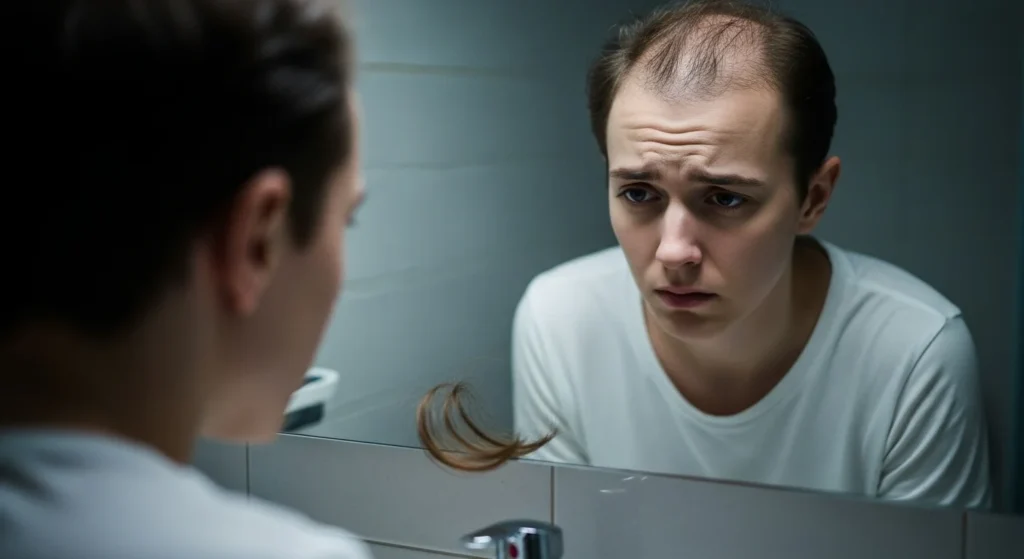Summary
Abemaciclib is a cancer treatment known to cause hair loss as a side effect. While this hair loss is typically temporary, it can significantly affect a patient’s self-esteem.
By adopting a gentle hair care routine, maintaining a healthy diet, and exploring cosmetic solutions like wigs, patients can manage the effects. Understanding Abemaciclib and Hair Loss works and the steps to manage it can help patients regain confidence during their treatment journey.
Introduction
If you’re undergoing treatment with abemaciclib, one of the concerns you may face is hair loss, which can affect your well-being and self-esteem. Abemaciclib is a cancer treatment that works by inhibiting certain proteins to slow down the growth of cancer cells. However, a common side effect that many patients experience is hair thinning and loss.
In this article, we’ll explain why this happens, how long it lasts, and what you can do to manage and minimise hair loss during treatment. By understanding the causes and knowing your options, you’ll feel empowered to manage this aspect of your recovery.
What is Abemaciclib?

Overview of Abemaciclib and Its Role in Cancer Treatment
Abemaciclib is a medication used primarily in the treatment of breast cancer, particularly in patients with advanced or metastatic hormone receptor-positive breast cancer. It belongs to a class of drugs known as CDK4/6 inhibitors, which help control the growth and division of cancer cells. Abemaciclib is often used in combination with other therapies to enhance its effectiveness.
How Abemaciclib Works to Fight Cancer
Abemaciclib works by blocking the activity of proteins called cyclin-dependent kinases 4 and 6 (CDK4/6), which play a crucial role in the cell cycle, allowing cells to divide and grow. By inhibiting these proteins, abemaciclib prevents the cancer cells from dividing and growing, ultimately reducing the size of the tumour or halting its progression.
Why Does Abemaciclib Cause Hair Loss?
The Science Behind Hair Loss with Cancer Treatments
Hair loss is a well-known side effect of many cancer treatments, including chemotherapy and certain targeted therapies like abemaciclib. While chemotherapy directly affects rapidly dividing cells (which include hair follicle cells), abemaciclib disrupts the cell cycle, which can also impact the cells responsible for hair growth.
Abemaciclib’s Effect on the Hair Growth Cycle
Hair growth occurs in cycles: growth (anagen), rest (telogen), and shedding (catagen). Abemaciclib interferes with the normal hair growth cycle by causing the hair follicles to enter the shedding phase prematurely. This disruption leads to hair thinning and hair loss. The hair loss is typically not as severe as with chemotherapy, but it can still be significant enough to cause concern for patients.
Managing Hair Loss During Abemaciclib Treatment
Hair Care Tips to Minimize Damage
To minimise hair damage while on abemaciclib, gentle care is essential. Here are some tips:
- Avoid harsh hair treatments: Refrain from colouring, perming, or using hot tools on your hair. Opt for natural styles and gentle handling.
- Use mild, sulfate-free shampoos: Choose hair products that nourish and protect the scalp without stripping it of natural oils.
- Gentle brushing: Use a wide-tooth comb or a soft brush to detangle your hair and avoid pulling out fragile strands.
Nutritional Support for Healthy Hair
Maintaining a balanced diet is crucial for supporting hair health during treatment. Include foods rich in:
- Biotin and zinc: Both are essential for hair health and growth.
- Omega-3 fatty acids: These help nourish the scalp and promote healthy hair follicles.
- Iron: Prevents anaemia, which can lead to additional hair thinning.
Wigs, Hairpieces, and Other Cosmetic Solutions
For many patients, wigs and hairpieces provide an excellent solution to help them cope with hair loss. Today’s wigs are designed to look and feel natural. When choosing a wig:
- Opt for wigs made from high-quality synthetic or human hair.
- Consider custom fittings for the best comfort and appearance.
- Explore options for headscarves or hats for a different style if wigs feel uncomfortable.
How Long Does Hair Loss Last with Abemaciclib?
Temporary vs. Permanent Hair Loss
In most cases, hair loss due to abemaciclib is temporary. Once treatment stops, many patients experience hair regrowth. However, the rate and extent of regrowth can vary depending on individual factors, such as:
- Overall health and nutritional status
- Duration of treatment
- Response to the medication
When Will Hair Start to Grow Back?
Hair regrowth typically begins 3 to 6 months after stopping the treatment. However, it may take up to a year for the hair to return to its full volume, and some patients may experience changes in texture or thickness.
Expert Advice on Coping with Hair Loss During Abemaciclib Treatment
Psychological Impact of Hair Loss
Hair loss can have a profound emotional impact. Patients may experience a loss of self-esteem and confidence. It’s essential to:
- Talk openly with loved ones about how you’re feeling.
- Consider psychological support, such as counselling or joining a support group for cancer patients.
- Explore mindfulness techniques, such as meditation, to manage stress and anxiety related to hair loss.

Frequently Asked Questions About Abemaciclib and Hair Loss
Will My Hair Grow Back After I Stop Taking Abemaciclib?
Yes, in most cases, hair regrowth occurs once treatment ends. However, the timeline for regrowth can vary. Be patient, as it may take several months for noticeable changes.
How Can I Prevent Hair Loss While Taking Abemaciclib?
While you can’t entirely prevent hair loss, adopting a gentle hair care routine and ensuring you maintain a balanced diet can help minimise the impact. Consult your oncologist about potential treatments to reduce hair thinning.
Are There Any Treatments for Hair Loss Caused by Abemaciclib?
Some patients explore treatments such as topical minoxidil, but it’s crucial to discuss options with your healthcare provider before starting any new treatments.
How to Manage Abemaciclib-Induced Hair Loss
Dealing with hair loss during cancer treatment can be challenging, but knowing your options and taking proactive steps can help you feel more in control. If you are concerned about hair loss or want personalised advice, book a consultation with Dr Rana Irfan today to discuss how to manage hair loss during abemaciclib treatment.
Hair loss is a common side effect of abemaciclib, but with the right care and support, you can manage it effectively. By following expert advice, maintaining a healthy lifestyle, and considering cosmetic options, you can reduce the impact of hair loss and regain your confidence. Always consult with your oncologist for personalised guidance.
